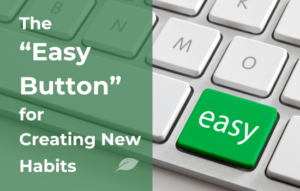
How often do you struggle to decide whether or not you should brush your teeth in the morning? Do you have an internal debate over the pros and cons? Does your responsible side argue that, if you don’t brush your teeth, your breath will smell bad and your teeth will rot? Does your lazy side argue that it’d be perfectly acceptable just let it go for one day?
Ridiculous, right? For most of us, brushing our teeth each morning is an ingrained habit. There’s no decision to be made. It’s just what we do—often, without even thinking about it.
Habits can be powerful things.
Not all of our habits are good habits, though. Some are things we’d like to change, and God has given our bodies the ability to do just that.
Our basal ganglia is the part of our brain that takes note of the tasks we repeatedly perform and then, over time, turns those repeated tasks into habits that become automatic. According to research by the National Library of Medicine, we can “expect habit formation (based on daily repetition) to take around 10 weeks.”
But, even with our physiology helping us, those first 10 weeks will, likely, be rather difficult. During that time, we need to consistently remind ourselves what we want to do (or want to not do), and then complete the task in the new way. Every day, we will struggle with the urge to do the comfortable and familiar thing but must decide to, instead, do the difficult, uncomfortable thing. Some days, even though we give it our best, we won’t do the new thing correctly. Or at all. Some days, our rebellious spirit may decide we just don’t want to do the thing we had previously determined we wanted to do—something we know will be for our own benefit and improvement. When we fail to be consistent, we may beat ourselves up, or we may give up. Only when we are able to consistently do the thing in the new way, for 10 weeks or so, will it become something we have to think less and less about. Until it becomes locked in as a habit.
Wouldn’t it be nice if there was an “easy button” to help us form new habits?
For some things, there is! That “easy button” is automation. Through automation, we can set some things up so that we only have to make the decision one time and be virtually assured that the outcome we want will happen.
For example, when we go to the dentist…before we leave, most dentists these days will ask us if we want to schedule our next cleaning in six months. If we say, “yes,” and schedule our next cleaning there and then, the process is automated, and the desired outcome is much more likely to occur. We don’t have to worry about forgetting to reschedule (running the risk that our “6-month cleaning” doesn’t happen until next year). Automated systems get us the desired result with a whole lot less stress.
Another example of an “easy button” is making automated deposits to your retirement fund. You can have your internal debate one time, weighing whether you want a few more dollars in your pocket now, or freedom and financial security in retirement. And, if you decide it’s best for your future and your future ministry to save for retirement now, you don’t have to have that same conversation with yourself month after month. Doing that over and over again just steals your time, causes you stress, and opens the door for you to forget to transfer your contribution to your account some months…which can have a significant impact on whether or not you reach your retirement goals.
We encourage you to use the “easy button” of automation whenever possible—and we, especially, recommend it for establishing the habit of saving.
Once you’ve made the decision to save for your retirement, the Board of Retirement is here to help. If any unforeseen circumstances arise, you can always change the automation you have set up but, for most people, that will never be necessary. You’ll be glad you’ve pushed that “easy button” to automate your decision—without having to go through 10 weeks (or more!) of struggle, as you attempt to establish the savings habit all on your own.
Christy Kohnle is a communications consultant and owner of Paradox Communications. She grew up in the Church and has been a life-long Christian, with a strong interest in Biblical financial stewardship. Christy has been managing the BOR communications since September, 2021.


